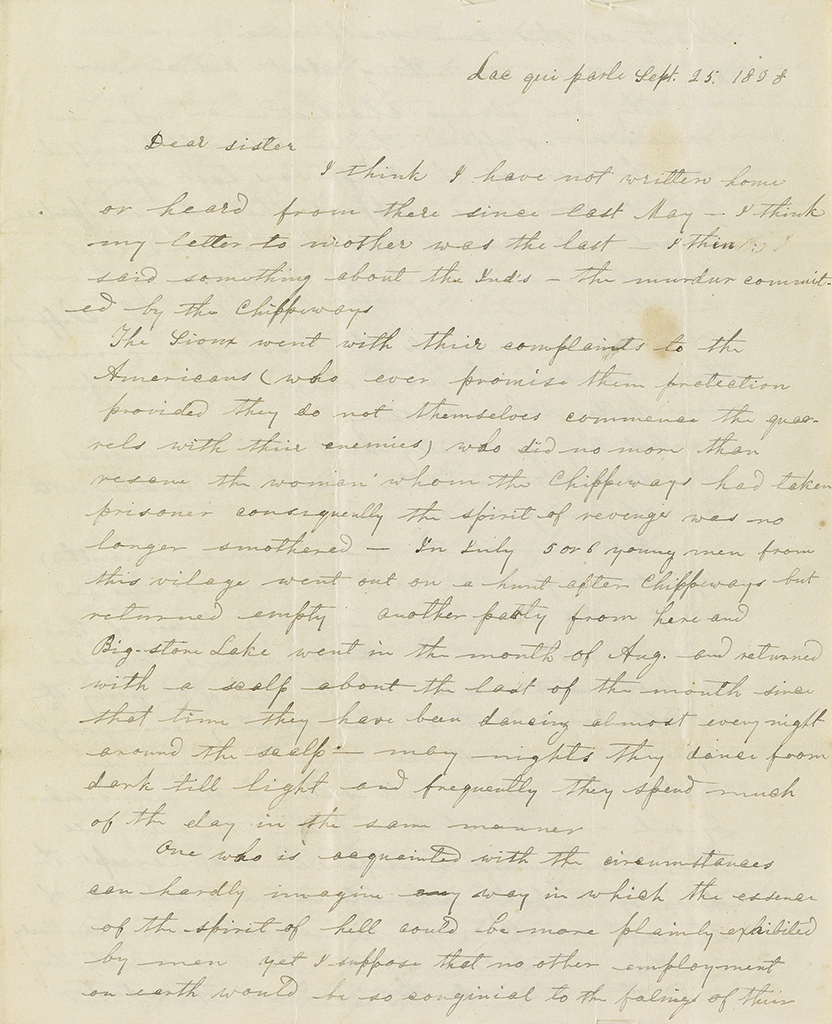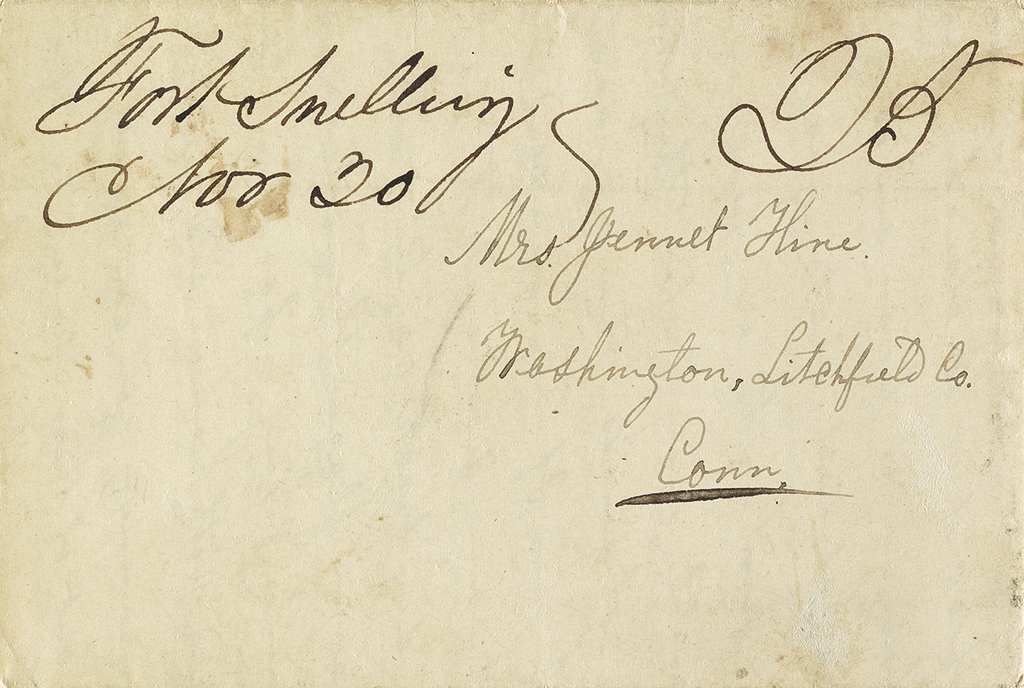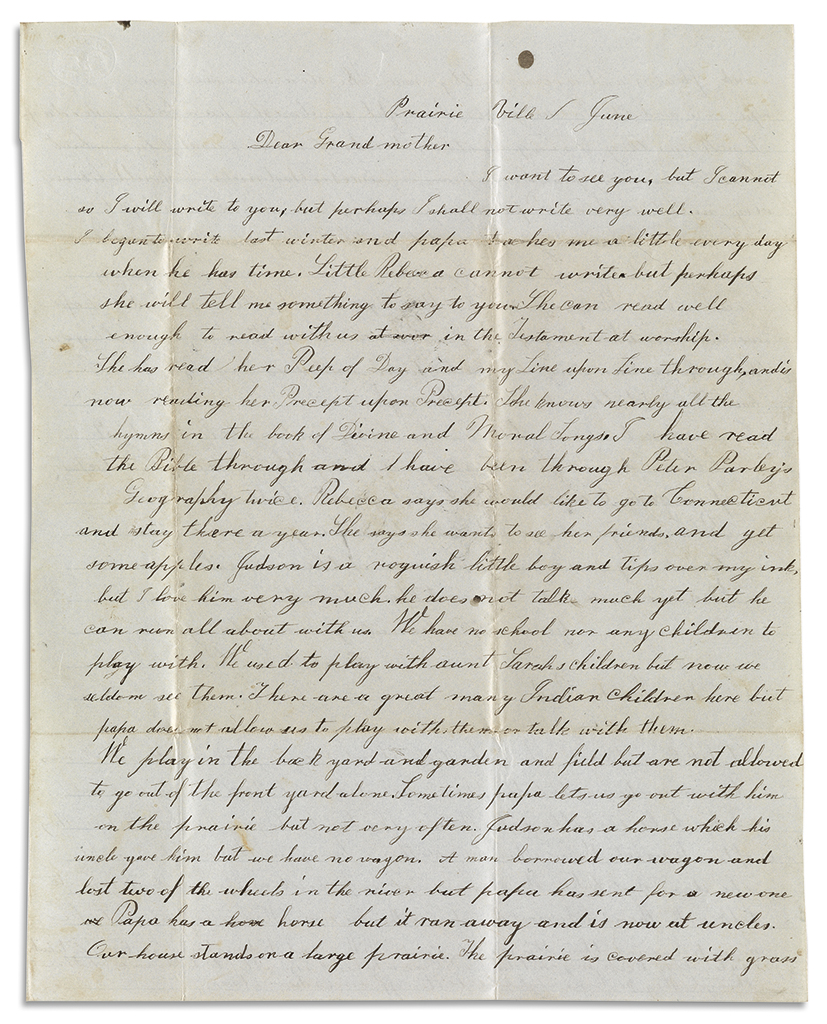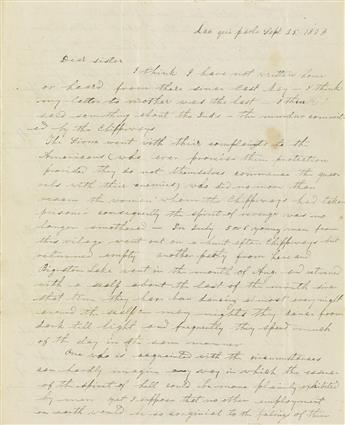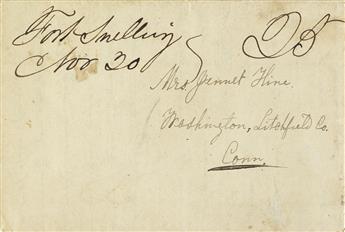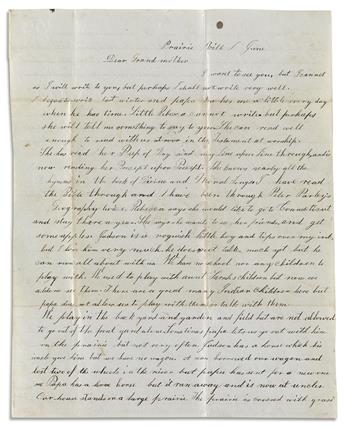Sale 2455 - Lot 166
Price Realized: $ 90,000
Price Realized: $ 112,500
?Final Price Realized includes Buyer’s Premium added to Hammer Price
Estimate: $ 30,000 - $ 40,000
"THEY HAVE BEEN DANCING ALMOST EVERY NIGHT AROUND THE SCALP" (MINNESOTA.) Large archive of Indian missionary letters written by the Pond family on the Minnesota frontier. 245 Autograph Letters Signed from various family members; various sizes and conditions. Vp, 1833-93
Additional Details
Brothers Samuel and Gideon Pond of Washington, CT experienced religious conversions in 1831, and resolved to bring the Gospel to the Indians of the west. Samuel Pond (1808-1891) left in 1833 without any official support or credentials. Gideon followed him the next year, when they established themselves in Minnesota as missionaries among the Dakota Sioux. Eventually, four Pond siblings and their spouses went to Minnesota and raised families. Most of the letters in this collection are from Samuel William Pond (1808-1891), Gideon Hollister Pond (1810-1878) and his wife Agnes, Ruth Pond Riggs (1813-1882), and Frederick Philip Pond (1819-1891) and his wife Martha. Also appearing frequently are Samuel's daughters Jennet Clarissa and Rebecca Cordelia. Most of the letters are addressed to family matriarch Sarah Hollister Pond (1775-1864), her daughter Jennet Pond Hine (1802-1892), and husband Jonathan Hine, who remained behind in Washington, CT.
Samuel Pond is the central character of this archive--the first to head west and the most frequent correspondent with 63 letters. His first Minnesota letter is dated 22 June 1834 from St. Peter: "Gideon & I mean to build us a log house this summer . . . 7 or 8 miles from the mouth of the St. Peters River. . . . The Indian Agent here wished to have us build there. He offered to furnish us with a yoke of oxen to build with & such tools as we want. The Indians selected the place for the house to stand. It is about one hundred rods from an Indian village." He gained the trust of the Indians by teaching them agriculture, as he explained in this circa 1835 letter from Lake Minnetonka: "We have been able to render the Indians essential benefit and they know it. The Chief called on us last night to make a visit. He says he has seen the Chippeways, that he shook hands with them, and told them that we were here & that we had ploughed for them and they raised a great deal of corn."
His brother Gideon joined him early in 1834. In a 1 March 1835 letter from Lake Calhoun, he wrote: "I sit upon the ground in an Indian hut and have [mu]ch I want to say, but cannot, and if they talk, it is generally to tell how many men and women and children they have killed, how much game they take in hunting, that they are cold without cloths, have nothing to eat &c." In their first years in Minnesota, Samuel and Gideon moved frequently, spending time in St. Peter, Prairieville, Lake Calhoun and Lake Harriet (both in present-day Minneapolis), and Lac Qui Parle near the present South Dakota border. Samuel wrote on New Year's Day in 1836 from St. Peter: "I spent one month with the Indians on their hunt, the Lord took care of me. . . . I began to teach some of the children their letters. Their parents are pleased with it." A 25 September 1838 letter from Lac Qui Parle describes a conflict between Sioux and nearby Chippewa at great length: "Another party from here and Big-Stone Lake went out in the month of Aug. and returned with a scalp about the last of the month. Since that time, they have been dancing almost every night around the scalp. Many nights they dance from dark till light and frequently they spend much of the day in the same manner. . . . The Chippeways were driven across the Mississippi. Missing their canoes they were obliged to swim, five were killed while crossing. But they generally hunt their enemies as they do beaver or otter, except it is conducted with much religious ceremony." Drinking habits are discussed in Gideon's 28 September 1841 letter: "At some of their villages they are drunk days and sometimes weeks together. . . . There is always more or less fighting at such times. I am acquainted with a number of men who had their fingers and thumbs bit off in drunken frolics."
As the Pond brothers gradually became more established, they were joined by wives and raised children on the frontier. Samuel described the arrival of Gideon's first daughter on 22 June 1839: "Her Indian name is O-do-wah-nah. It means the Little Song. The Indians named her and we generally call her by that name." Samuel's daughter Jennet wrote circa 1850: "We have no school nor any children to play with. . . . There are a great many Indian children here, but Papa does not allow us to play with them or talk with them." 37 of the letters were written during the period of the brothers' active work with the Sioux from 1834 to 1853. In 1853, Samuel became one of the first white settlers of Shakopee, MN (it is now a suburb of Minneapolis), and was soon joined by the families of his brother Frederick Pond and sister Ruth Riggs. From this point onward, the letters describe the transition from frontier to rural life, discussing the relocation of the Indians and the arrival of the railroad. Some of these later letters discuss the Civil War and the Dakota War of 1862. Samuel wrote on 10 February 1863: "Gideon went up lately to see the Indians in prison and baptized some of them."
The collection also has some philatelic significance. 24 of the early letters are franked "Fort Snelling" in the address panel with the postage of "10" or "25" written in manuscript, 1834-49. Another dated 1835 is franked from Prairie du Chien, WI. Among the early inked postmarks are 5 from Fort Snelling dated 1850, each stamped "10."
Other Pond letters from this period were quoted in Samuel W. Pond's Jr.'s 1893 memoir, "Two Volunteer Missionaries Among the Dakotas," but these letters appear to be unpublished. The collection is remarkable in its depth on the Indians and early settlements of Minnesota. A full inventory of the collection with abstracts of each letter is available upon request.
Samuel Pond is the central character of this archive--the first to head west and the most frequent correspondent with 63 letters. His first Minnesota letter is dated 22 June 1834 from St. Peter: "Gideon & I mean to build us a log house this summer . . . 7 or 8 miles from the mouth of the St. Peters River. . . . The Indian Agent here wished to have us build there. He offered to furnish us with a yoke of oxen to build with & such tools as we want. The Indians selected the place for the house to stand. It is about one hundred rods from an Indian village." He gained the trust of the Indians by teaching them agriculture, as he explained in this circa 1835 letter from Lake Minnetonka: "We have been able to render the Indians essential benefit and they know it. The Chief called on us last night to make a visit. He says he has seen the Chippeways, that he shook hands with them, and told them that we were here & that we had ploughed for them and they raised a great deal of corn."
His brother Gideon joined him early in 1834. In a 1 March 1835 letter from Lake Calhoun, he wrote: "I sit upon the ground in an Indian hut and have [mu]ch I want to say, but cannot, and if they talk, it is generally to tell how many men and women and children they have killed, how much game they take in hunting, that they are cold without cloths, have nothing to eat &c." In their first years in Minnesota, Samuel and Gideon moved frequently, spending time in St. Peter, Prairieville, Lake Calhoun and Lake Harriet (both in present-day Minneapolis), and Lac Qui Parle near the present South Dakota border. Samuel wrote on New Year's Day in 1836 from St. Peter: "I spent one month with the Indians on their hunt, the Lord took care of me. . . . I began to teach some of the children their letters. Their parents are pleased with it." A 25 September 1838 letter from Lac Qui Parle describes a conflict between Sioux and nearby Chippewa at great length: "Another party from here and Big-Stone Lake went out in the month of Aug. and returned with a scalp about the last of the month. Since that time, they have been dancing almost every night around the scalp. Many nights they dance from dark till light and frequently they spend much of the day in the same manner. . . . The Chippeways were driven across the Mississippi. Missing their canoes they were obliged to swim, five were killed while crossing. But they generally hunt their enemies as they do beaver or otter, except it is conducted with much religious ceremony." Drinking habits are discussed in Gideon's 28 September 1841 letter: "At some of their villages they are drunk days and sometimes weeks together. . . . There is always more or less fighting at such times. I am acquainted with a number of men who had their fingers and thumbs bit off in drunken frolics."
As the Pond brothers gradually became more established, they were joined by wives and raised children on the frontier. Samuel described the arrival of Gideon's first daughter on 22 June 1839: "Her Indian name is O-do-wah-nah. It means the Little Song. The Indians named her and we generally call her by that name." Samuel's daughter Jennet wrote circa 1850: "We have no school nor any children to play with. . . . There are a great many Indian children here, but Papa does not allow us to play with them or talk with them." 37 of the letters were written during the period of the brothers' active work with the Sioux from 1834 to 1853. In 1853, Samuel became one of the first white settlers of Shakopee, MN (it is now a suburb of Minneapolis), and was soon joined by the families of his brother Frederick Pond and sister Ruth Riggs. From this point onward, the letters describe the transition from frontier to rural life, discussing the relocation of the Indians and the arrival of the railroad. Some of these later letters discuss the Civil War and the Dakota War of 1862. Samuel wrote on 10 February 1863: "Gideon went up lately to see the Indians in prison and baptized some of them."
The collection also has some philatelic significance. 24 of the early letters are franked "Fort Snelling" in the address panel with the postage of "10" or "25" written in manuscript, 1834-49. Another dated 1835 is franked from Prairie du Chien, WI. Among the early inked postmarks are 5 from Fort Snelling dated 1850, each stamped "10."
Other Pond letters from this period were quoted in Samuel W. Pond's Jr.'s 1893 memoir, "Two Volunteer Missionaries Among the Dakotas," but these letters appear to be unpublished. The collection is remarkable in its depth on the Indians and early settlements of Minnesota. A full inventory of the collection with abstracts of each letter is available upon request.
Exhibition Hours
Exhibition Hours
Aliquam vulputate ornare congue. Vestibulum maximus, libero in placerat faucibus, risus nisl molestie massa, ut maximus metus lectus vel lorem.



